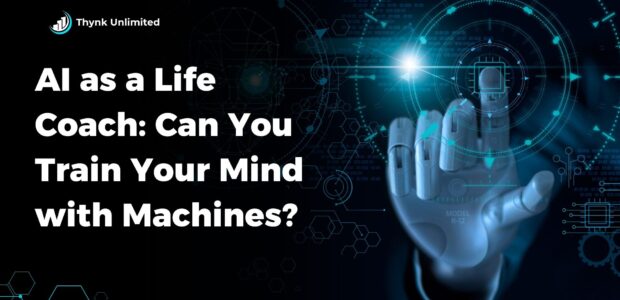AI as a Life Coach: Can You Train Your Mind with Machines?
In 2025, personal development has gone digital. From meditation reminders to emotional check-ins and productivity nudges, artificial intelligence is no longer just powering your devices—it’s helping to shape your mindset, habits, and wellbeing.
Welcome to the era of the AI Life Coach, where algorithms meet self-awareness, and machines guide humans toward better lives. But can a non-human really help us grow? Can AI replace—or even enhance—the wisdom of a human coach or therapist?
In this blog, we explore how AI is transforming mental training, the tools leading the way, and the ethical questions that come with outsourcing self-help to software.
🤖 What Is an AI Life Coach?
An AI life coach is a digital assistant programmed to support personal development. Unlike human coaches, AI coaches:
-
Operate 24/7
-
Offer unbiased, judgment-free feedback
-
Use machine learning to personalise strategies over time
They help users:
-
Set and track goals
-
Manage time and habits
-
Reflect on thoughts and emotions
-
Stay motivated and consistent
Popular examples include Replika, CoachAI, Woebot, Wysa, and Youper, which blend conversational AI with cognitive behavioural therapy (CBT), habit tracking, or coaching frameworks.
🧠 How AI Helps You Train Your Mind
1. Daily Emotional Check-Ins
AI-powered apps prompt users to record their mood, thoughts, or triggers, then respond with affirmations, guided journaling, or CBT-based strategies.
2. Habit Formation and Goal Tracking
AI tools like Fabulous, Mindsera, or Opal build custom routines, remind users when they’re off track, and adapt based on progress.
3. Mental Reframing Through Dialogue
Chat-based AI (e.g., Wysa or ChatGPT in coaching mode) helps users reframe negative thinking, challenge limiting beliefs, and develop healthier self-talk.
4. Meditation, Focus, and Sleep Support
Apps like Calm AI, Sleep Cycle Coach, or Headspace with AI enhancements personalise sessions based on your stress levels or schedule.
5. Productivity Coaching
AI coaches like Motion or Reclaim.ai organise your time around energy cycles, suggesting when to focus, rest, or reschedule. Think of it as a mental fitness planner.
💬 What Makes AI Coaching Unique?
-
Always available: No appointments, just instant support.
-
No judgment: Users often feel safer opening up to AI.
-
Data-driven: AI learns from your habits, goals, and moods.
-
Private: Sessions stay between you and your digital coach.
⚖️ The Limitations of AI as a Coach
Despite rapid improvements, AI coaching still has limits:
-
No real empathy: AI can simulate understanding, but can’t truly feel.
-
Not ideal for trauma or deep psychological issues—human therapists are still essential.
-
Over-reliance risk: Relying too heavily on AI may reduce social connection or real-world feedback.
-
Privacy concerns: Mental health data is sensitive, and some worry how it’s stored or used.
The ideal model? A hybrid approach—using AI for day-to-day support, while maintaining human relationships for deeper work.
🔮 The Future of AI Life Coaching
In the next few years, expect:
-
Wearable-integrated coaching: Your smartwatch will suggest breathing exercises after detecting a spike in your heart rate.
-
Emotionally intelligent AI: Tools that detect vocal tone or facial expressions for deeper understanding.
-
Custom avatars: AI coaches that mimic preferred communication styles—calm, tough-love, motivational, or even humorous.
-
VR coaching environments: Immersive self-improvement simulations or visualisation exercises guided by AI.
The goal isn’t to replace human coaches—but to give everyone, everywhere, affordable, on-demand support.
🧘 Final Thoughts
Can machines help us master our minds? In many ways, yes. AI life coaches are practical, accessible, and increasingly personalised. They can’t replace deep emotional connection—but they can augment your growth, keep you accountable, and guide your day-to-day evolution.
In 2025, self-help isn’t just a book—it’s an app that learns with you.
Whether you’re building discipline, battling stress, or just looking for a daily mindset boost, your next coach might not be human—but it might still change your life.


